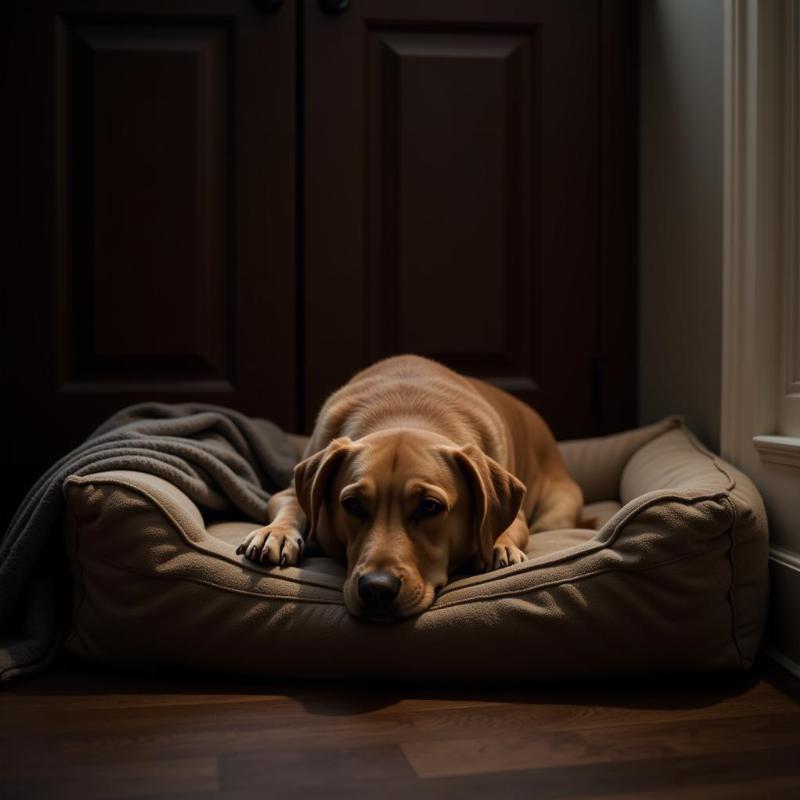Excessive panting in dogs at night can be concerning for pet owners. While some panting is normal, especially after activity or in warm weather, persistent heavy panting at night could signal an underlying issue. This article will explore the common reasons why your dog might be panting a lot at night and what you can do to help.
Understanding Normal Panting vs. Problem Panting
Dogs don’t sweat like humans, so they pant to regulate their body temperature. A little panting after a playful romp or on a hot summer night is perfectly normal. However, if your dog is consistently panting heavily at night, even when it’s cool and they’ve been resting, it’s time to investigate further. Consider the frequency, intensity, and accompanying symptoms to determine if your dog’s panting is a cause for concern.
Possible Causes of Excessive Nighttime Panting
Several factors can contribute to a dog panting excessively at night. These range from simple anxieties to more serious medical conditions. Let’s explore some of the most common culprits:
Pain or Discomfort
Just like us, dogs may pant when they’re experiencing pain. Arthritis, injuries, or other medical conditions can make them uncomfortable, especially at night when it’s quieter and distractions are minimized.
Anxiety or Stress
Dogs can experience anxiety just like humans. Separation anxiety, fear of thunderstorms, or even changes in routine can trigger panting, particularly at night when they might feel more vulnerable.
Heart Conditions
Heart problems can interfere with a dog’s ability to circulate oxygen efficiently, leading to increased panting. This is especially true during periods of rest or sleep.
Respiratory Issues
Respiratory infections, allergies, or other breathing problems can make it difficult for a dog to get enough oxygen, resulting in excessive panting.
Obesity
Overweight dogs have to work harder to breathe, especially when lying down. This extra effort can lead to increased panting, especially at night.
Medications
Certain medications, such as steroids, can cause increased panting as a side effect.
When to Seek Veterinary Care
If your dog’s panting is sudden, severe, or accompanied by other symptoms like coughing, vomiting, or lethargy, seek immediate veterinary attention. Even if the panting seems less urgent but is persistent, a checkup is recommended to rule out any underlying health problems.
What You Can Do to Help
While consulting a veterinarian is crucial for diagnosing and treating any underlying medical conditions, there are some things you can do at home to help your dog:
- Ensure a Comfortable Environment: Make sure your dog’s sleeping area is cool, quiet, and comfortable. A comfortable bed and a familiar blanket can help reduce anxiety.
- Regular Exercise: Appropriate exercise can help manage weight, reduce stress, and improve overall health, potentially lessening nighttime panting.
- Mental Stimulation: Providing mental enrichment through toys, puzzles, or training can help alleviate anxiety and boredom.
- Maintain a Consistent Routine: A predictable routine can provide a sense of security and reduce stress, particularly for dogs with anxiety.
 Giường chó thoải mái
Giường chó thoải mái
Conclusion
Nighttime panting in dogs can have various causes, from simple anxiety to more serious health concerns. By observing your dog closely and consulting with a veterinarian, you can determine the underlying cause and take appropriate action to ensure your furry friend’s comfort and well-being. Remember, persistent panting shouldn’t be ignored, as it could be a sign of a problem that needs addressing.
FAQ
- Is it normal for my dog to pant a little at night? Some panting after activity or in warm temperatures is normal. However, excessive or persistent panting warrants further investigation.
- What are the signs that my dog’s panting is serious? Sudden, severe panting, or panting accompanied by other symptoms like coughing, vomiting, or lethargy requires immediate veterinary attention.
- Can anxiety cause a dog to pant at night? Yes, anxiety can definitely trigger panting, especially at night when dogs might feel more vulnerable.
- How can I help my dog if they’re panting due to anxiety? Creating a comfortable, predictable environment, providing mental stimulation, and ensuring regular exercise can help reduce anxiety and panting.
- What if my dog is panting and I don’t know why? Consult with your veterinarian to determine the underlying cause and receive appropriate treatment.
Suggested Further Reading
Beautdogs.us is your premier source for all things dog-related in the US. We offer expert advice on dog breeds, care, and the latest products, catering to both new and experienced dog owners. We’re passionate about helping you build a strong, healthy relationship with your canine companion. For personalized guidance and support, reach out to us! Email: [email protected], Phone: +1 501-555-7529 or visit Beautdogs.us.